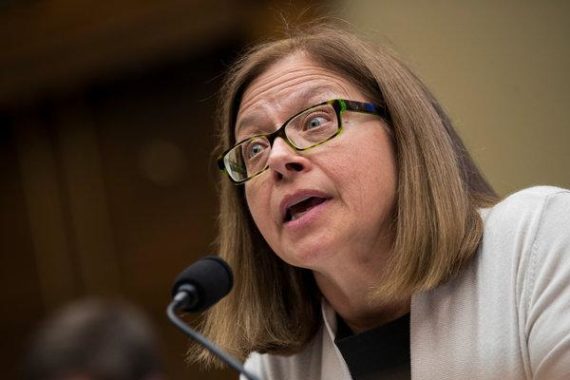
(12-28-18) Dr. Elinore McCance-Katz is my choice for the person who has had the biggest impact in mental health during 2018.
Appointed by the Trump administration in September 2017 as the first Assistant Secretary for Mental Health and Substance Use, Dr. McCance-Katz has dramatically changed the focus at the Substance Abuse and Mental Health Services Administration.
She has made serious mental illnesses a priority and has directed SAMHSA to create and fund programs based on clinical results and science.
Her leadership is a much needed breath of fresh air from the previous administrator who was harshly criticized by Congress for reportedly showing little interest in serious mental illnesses and whose leadership resulted in SAMHSA employees ranking morale inside their agency as among the lowest in the entire federal government.
SAMHSA received a budget increase of 35% under the Trump administration, allowing it to more than double the number of grants that it awarded in 2018 from 600 to 1,300. Simply distributing money is no solution, especially if it goes to wasteful programs, which is why one of Dr. McCance-Katz’s first orders was a thorough review of what constitutes an evidence based practice worthy of funding. Given that some so-called evidence based practices in the past were based on little or no real evidence, this was a major directional change. At the same time, SAMHSA streamlined its application review process, cutting the application from 25 pages to 10 and the number of questions for applicants from 25 to a mere 9 so that federal funds could be released more quickly to those programs that deserve them.
Making the process more vigilant, efficient and easier to use might not seem sexy, but awarding grants is how the federal government helps steer states. (For example, SAMHSA recently awarded $61.1 million for suicide prevention programs.) Having someone as assistant secretary who actually is making Americans with serious mental illnesses a prime concern is a godsend.
SAMSHA was blasted by Congress for not employing a single psychiatrist at one point under its previous director. Under McCance-Katz, SAMHSA’s Office of the Chief Medical Officer now employs psychiatrists, a clinical psychologist and nurse so the agency can benefit from professionals with real world experiences.
Dr. McCance-Katz is an addiction specialist and she was ordered by Congress to prioritize the opioid crisis, which she has. But she has not done that at the expense of untreated serious mental illnesses.
With urging from the non-federal members of the Interdepartmental Serious Mental Illness Coordinating Committee (ISMICC), she was able to persuade U.S. Health and Human Services Secretary Alex M. Azar II to allow states to apply for Medicaid waivers to the IMDs, or institutions of mental disease. Put simply, states are not allowed to seek reimbursement for services at facilities that hold more than 16-beds. Granting states waivers will help combat our current national treatment bed shortage. This shift comes with conditions that still could be difficult for states to meet. Waivers must be budget neutral, meaning that the “demonstration cannot cost the federal government more than what it would have paid absent the demonstration.” Restrictions remain on what Medicaid will and will not reimburse.
Despite these limitations, getting the federal government to open the door and pay for residential treatment in larger facilities is a major change.
Under Dr. McCance-Katz’s leadership, representatives from HHS, Justice, the Veterans Administration, Labor, HUD, Education and the Social Security Administration have begun talking to each other to better coordinate their agency programs that provide services to Americans with mental disorders. This cooperation, especially between HHS and HUD, is extremely important. For too many years, the federal government has failed to acknowledge how mental health recovery is dependent on housing and other non-medical help. Getting these agencies to coordinate their actions was ordered by Congress under the 21st Century Cures Act. That law also created ISMICC, on which I serve. Its 14 non-federal members released a detailed list of recommendations at the end of 2017. Under Dr. McCance-Katz leadership, our federal partners from each of the previously mentioned departments have divided themselves into five workgroups to address such problems as the inappropriate incarceration of individuals with mental illnesses.
SAMHSA also has launched an effort in 23 states to create real-time bed registries to identify available beds and post crisis follow-up services for those living with serious mental illnesses.
Dr. McCance-Katz’s decision to reassigned a senior staff member, who was a nationally known leader in the peer movement, raised questions about her support of peer services. But under her leadership, opportunities for peers have increased and she has often spoken of peers’ importance in the recovery process.
Taking charge of any large federal bureaucracy is daunting. When I covered Congress, it was widely known that it took many newly elected members a year to learn the basic ground rules of Capitol Hill and, jokingly, where the bathrooms were located. Federal agencies with their unwritten rules and internal allegiances are equally difficult to herd. Dr. McCance-Katz benefited from spending two years at SAMHSA as its first Chief Medical Officer before resigning and writing a scathing review of the agency.
She has returned as a tour de force to be reckoned with, quietly determined, and intent to use her four years to implement much needed changes. Most importantly in my eyes, she genuinely cares about individuals with serious mental illnesses and those of us who love them. She is being joined in that effort by many dedicated SAMHSA employees who have been fighting for decades to be heard.
As I write this, I have received a tweet that she just posted. It says it all.
“Thousands of Americans with serious mental illnesses are receiving no #treatment, no services, and no supports—this is another public health crisis that has serious consequences.” @DrMcCance_Katzbit.ly/RightToTreatment…



